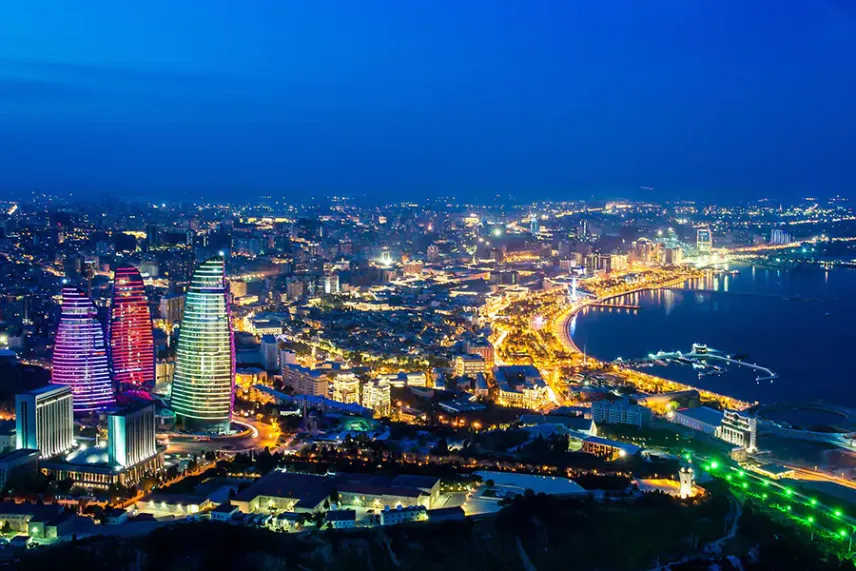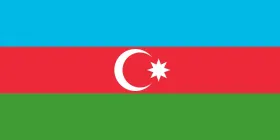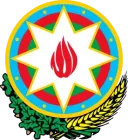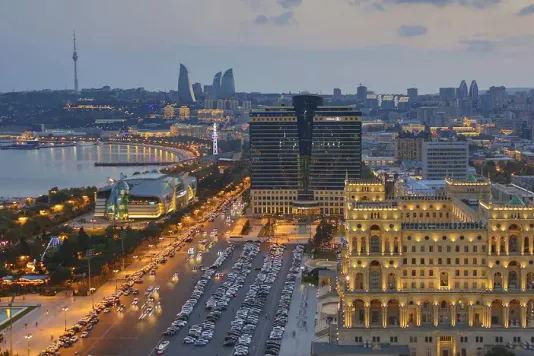Azerbaijan

Geographical Location of Azerbaijan
Azerbaijan is located in the South Caucasus, in the west of Asia. Azerbaijan has over 700 km of coastline along the Caspian Sea. The country consists of plains and high mountains. The climate of Azerbaijan is subtropical in the southern and eastern parts of the country. Rainfall is high in the south, while the rest of the country is drier. In the western and northern mountainous regions, the climate is similar to that of the Alps.
The Caspian Sea is heavily polluted by emissions and spills from the oil industry. The use of pesticides and artificial fertilizers during the Soviet era, combined with environmental destruction due to oil extraction, has destroyed much of the country's arable land. Coastal areas are prone to flooding, while other land areas suffer occasional droughts. The Azerbaijani authorities have taken the initiative of several environmental projects, and today the scale of the polluted industry has been significantly reduced.
Azerbaijan borders on five countries - Georgia, Armenia, Turkey, Russia and Iran. Part of the territory of Azerbaijan, Nakhichevan, is an exclave separated from the main territory of Azerbaijan by the territory of Armenia.
Brief History of Azerbaijan
Azerbaijan's central location between Europe, Asia, and the Middle East has meant that the area has been ruled by a number of different kingdoms throughout the country's history. The Arabs conquered the country in 642, after which Persia, Russia, the Ottomans and local shahs fought for possession of this territory. According to the Turkmenchay Treaty of 1828, Persia and Russia divided the territory between them. Modern Azerbaijan was included in the Russian Empire. When the Russian Empire collapsed during World War I, the country declared independence, but independence did not last long. The Azerbaijan Democratic Republic was conquered by the Red Army in 1920 and in the same year Azerbaijan was annexed to the Soviet Union. After the collapse of the Soviet Union, Azerbaijan again became an independent state.
Since the 1990s, Azerbaijan has been in conflict with Armenia over Nagorno-Karabakh. In Nagorno-Karabakh, the majority of the population is Armenian, but the territory belongs to Azerbaijan. The parties signed a truce in 1994, but in the fall of 2020, the conflict flared up again with violent clashes. The parties have since entered into a new ceasefire agreement. In the fall of 2023, Azerbaijan regained full control over the entire territory of Nagorno-Karabakh.
Society and Ppolitics of Azerbaijan
On paper, Azerbaijan is a semi-presidential democracy, but in practice, since 1993, the country has been dictatorially ruled by the Aliyev family. The president is the head of state and commander-in-chief of the army. In addition, he appoints the judges of the country. The number of presidential re-elections is not limited.
Corruption and electoral fraud are widespread. None of the elections held in our time are recognized by the international community as free and fair. Political opposition in Azerbaijan is suppressed, freedom of speech is severely restricted, critics of the regime are subject to arrest and imprisonment. The judicial system is also characterized by corruption and mistreatment of prisoners is common. There have been reports of gross discrimination against various minorities living in Azerbaijan.
Economy and Trade of Azerbaijan
Historically, trade has played an important role in the economy of Azerbaijan. After gaining independence, the country experienced rapid economic growth. The development of the offshore sector in the Caspian Sea has been the main driving force behind the country's economy. The most important natural resources of Azerbaijan are gas, iron ore and oil. The war against Armenia weakened the country's economy and international trade. However, in the years following the armistice, the economy began to slowly grow.
Corruption pervades society and is a serious problem in the country. Another challenge for Azerbaijan is that economic growth is completely dependent on the oil and gas sector. This makes the country vulnerable to fluctuations in world oil prices. The sharp drop in oil prices in 2015 affected the country's economy. It is not known how long oil reserves will last. Therefore, the authorities established an oil fund in order to preserve oil revenues for future generations.
Azerbaijani Cuisine and Culinary Traditions of Azerbaijan
One of the assets of Azerbaijan, as a country with a long history, is Azerbaijani cuisine, which is widely known not only in the country itself, but also far beyond its borders. Dishes such as baklava and shekerbura, dolma, bozartma and ovdukh, pilaf and shish kebab, as well as many other recipes of Azerbaijani cuisine https://kashevar.com/en/recipes/azerbaijan will not leave indifferent both Azerbaijanis themselves and tourists, as well as those who are simply interested in the traditions of this country and national Azerbaijani cuisine.








